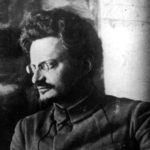Trotsky:1This transcript was printed in the internal bulletin of the Socialist Workers Party in June 1939. For reasons of security, the names were listed as pseudonyms: “Crux” for Trotsky, “Johnson” for C.L.R. James, and “Carlos” for Charles Curtiss. These pseudonyms have been replaced by the real names. (Comrade James’s manuscript read by the comrades prior to the meeting.) It is very important whether it is advisable and whether it is possible to create such an organization on our own initiative. Our movement is familiar with such forms as the party, the trade union, the educational organization, the cooperative; but this is a new type of organization which does not coincide with the traditional forms. We must consider the question from all sides as to whether it is advisable or not and what the form of our participation in this organization should be.
If another party had organized such a mass movement, we would surely participate as a fraction, providing that it included workers, poor petty bourgeois, poor farmers, and so on. We would enter to work for our party. But this is another thing. What is proposed here is that we take the initiative. Even without knowing the concrete situation in Negro circles in the United States, I believe we can admit that no one but our party is capable of forming such a movement on a realistic basis. Of course, the movements guided by the improvisatorial Negro leaders, as we saw them in the past, more or less epressed the unwillingness or the incapacity, the perfidy of all the existing parties.
None of the parties can assume such a task, because they are either pro-Roosevelt imperialists or anti-Roosevelt imperialists. Such an organization of the oppressed Negroes signifies to them the weakening of “democracy” and of Big Business. This is also true of the Stalinists. Thus, the only party capable of beginning such an action is our own party.
But the question remains as to whether we can take upon ourselves the initiative of forming such an organization of Negroes as Negroes — not for the purpose of winning some elements to our party, but for the purpose of doing systematic educational work in order to elevate them politically. What should be the form — what the correct line of our policy? That is our question.
Curtiss: As I have already said to Comrade James, the Communist Party organized the American Negro Labor Congress and the League of Struggle for Negro Rights. Neither one had great success. Both were very poorly organized. I personally think that such an organization should be organized, but I think it should be done carefully and only after a study of all the factors involved and also of the causes of the breakdown of the two organizations mentioned. We must be sure of a mass base. To create a shadow of ourselves would serve only to discredit the idea and would benefit no one.
Trotsky: Who were the leaders of these organizations?
Curtiss: Fort-Whiteman, Owen, Haywood, Ford, Patterson; Bob Minor was the leader of the CP’s Negro work.
Trotsky: Who are the leaders now?
Curtiss: Most of them are in the CP, so far as I know. Some have dropped out of the movement.
Owen: Comrade James seems to have the idea that there is a good chance of building such an organization in the immediate future. I would like to have him elaborate.
James: I think that it should be a success because I met great numbers of Negroes and spoke to many Negro organizations. I brought forward the point of view of the Fourth International particularly on the war question and in every case there was great applause and a very enthusiastic reception of the ideas. Great numbers of these Negroes hated the Communist Party … Up to the last convention, 79% of the Negro membership of the CP in New York State, 1,579 people, had left the CP. I met many of the representative ones and they were now willing to form a Negro organization but did not wish to join the Fourth International. I had come to the conclusion that there was this possibility of a Negro organization before I left New York, but waited until I had gone through various towns in the States and got into contact with the Negro population there. And I found that the impressions that I had gathered in New York corresponded to those that I found on the tour…
Trotsky: I have not formed an opinion about the question because I do not have enough information. What Comrade James tells us now is very important. It shows that we can have some elements for cooperation in this field, but at the same time, this information limits the immediate perspective of the organization. Who are those elements? The majority are Negro intellectuals, former Stalinist functionaries and sympathizers. We know that now large strata of intellectuals are turning back to the Stalinists in every country. We have observed such people who were very sympathetic to us: Eastman, Solow, Hook, and others. They were very sympathetic to us insofar as they considered us an object for their protection. They abandoned the Stalinists and looked for a new field of action, especially during the Moscow Trials, and so for the period, they were our friends. Now since we have begun a vigorous campaign, they are hostile to us.
Many of them are returning to all sorts of vague things — humanism, etc. In France, Plisnier, the famous author, went back to God as well as to democracy. But when the white intellectuals went back to Roosevelt and democracy, the disappointed Negro intellectuals looked for a new field on the basis of the Negro question. Of course we must utilize them, but they are not a basis for a large mass movement. They can be used only when there is a clear program and good slogans.
The real question is whether or not it is possible to organize a mass movement. You know for such disappointed elements we created FIARI.2The International Federation of Revolutionary Writers and Artists. It is not only for artists; anyone may enter. It is something of a moral or political “resort” for the disappointed intellectuals … That is one thing: but you consider threes Negro intellectuals for the directing of a mass movement.
Your project would create something like a pre-political school. What determines the necessity? Two fundamental facts: that the large masses of Negroes are backward and oppressed and this oppression is so strong that they must feel it every moment; that they feel it as Negroes. We must find the possibility of giving this feeling a political organizational expression. You may say that in Germany or in England we do not organize such semi-political, semi-trade-union, or semi-cultural organizations; we reply that we must adapt ourselves to the genuine Negro masses in the United States.
I will give you another example. We are terribly against the “French turn.”3The “French Turn” refers to the Trotskyists’ tactic of entering the Socialist Party in France. We abandoned our independence in order to penetrate into a centrist organization. You see that this Negro woman writes that they will not adhere to a Trotskyist organization. It is the result of the disappointments that they have had from the Stalinist organizations and also the propaganda of the Stalinists against us. They say, “We are already persecuted, just because we are Negroes. Now if we adhere to the Trotskyists, we will be even more oppressed.”
Why did we penetrate into the Socialist Party and into the PSOP?4The Workers and Peasants’ Socialist Party was a political party founded by Marceu Pivert in France in 1938. The Trotskyists joined the PSOP in 1939. If we were not the left wing, subject to the most severe blows, our powers of attraction would be ten or a hundred times greater; the people would come to us. But now we must penetrate into other organizations, keeping our heads on our shoulders and telling them that we are not as bad as they say.
There is a certain analogy with the Negroes. They were enslaved by the whites. They were liberated by the whites (so-called liberation). They were led and misled by the whites and they did not have their own political independence. They were in need of a pre-political activity, as Negroes. Theoretically it seems to me absolutely clear that a special organization should be created for a special situation. The danger is only that it will become a game for the intellectuals. This organization can justify itself only by winning workers, sharecroppers, and so on. If it does not succeed, we will have to confess that it was a failure. If it does succeed, we will be very happy because we will have a mass organization of Negroes. In that case I fully agree with Comrade James, except of course with some reservations on the question of self-determination, as was stated in our other discussion.
The task is not one of simply passing through the organization for a few weeks. It is a question of awakening the Negro masses. It does not exclude recruitment. I believe that success is quite possible; I am not sure. But it is clear for us all that our comrades in such an organization should be organized into a group. We should take the initiative. I believe it is necessary. This supposes the adaptation of our Transitional Program to the Negro problems in the States — a very carefully elaborated program with genuine civil rights, political rights, cultural interests, economic interests, and so on. It should be done.
I believe that there are two strata: the intellectuals and the masses. I believe that it is among the intellectuals that you find this opposition to self-determination. Why? Because they keep themselves separated from the masses, always with the desire to take on the Anglo-Saxon culture and of becoming an integral part of the Anglo-Saxon life. The majority are opportunists and reformists. Many of them continue to imagine that by the improvement of the mentality, and so on, the discrimination will disappear. That is why they are against any kind of sharp slogan.
James: They will maintain an intellectual interest because the Marxist analysis of Negro history and the problems of the day will give them an insight into the development of the Negroes which nothing else can. Also they are very much isolated from the white bourgeoisie and the social discrimination makes them therefore less easily corrupted, as, for example, the Negro intellectuals in the West Indies. Furthermore, they are a very small section of the Negro population and on the whole are far less dangerous than the corresponding section of the petty bourgeoisie in any other group or community. Also what has happened to the Jews in Germany has made the Negro intellectuals think twice. They will raise enough money to start the thing off. After that we do not have to bother in particular. Some, however, would maintain an intellectual interest and continue to give money.
Source: Bulletin of Marxist Studies No. 4 (New York: Pioneer Publishers, 1962) / Transcription: Marxists Internet Archive (also here)
Notes
| ↑1 | This transcript was printed in the internal bulletin of the Socialist Workers Party in June 1939. For reasons of security, the names were listed as pseudonyms: “Crux” for Trotsky, “Johnson” for C.L.R. James, and “Carlos” for Charles Curtiss. These pseudonyms have been replaced by the real names. |
|---|---|
| ↑2 | The International Federation of Revolutionary Writers and Artists. |
| ↑3 | The “French Turn” refers to the Trotskyists’ tactic of entering the Socialist Party in France. |
| ↑4 | The Workers and Peasants’ Socialist Party was a political party founded by Marceu Pivert in France in 1938. The Trotskyists joined the PSOP in 1939. |












